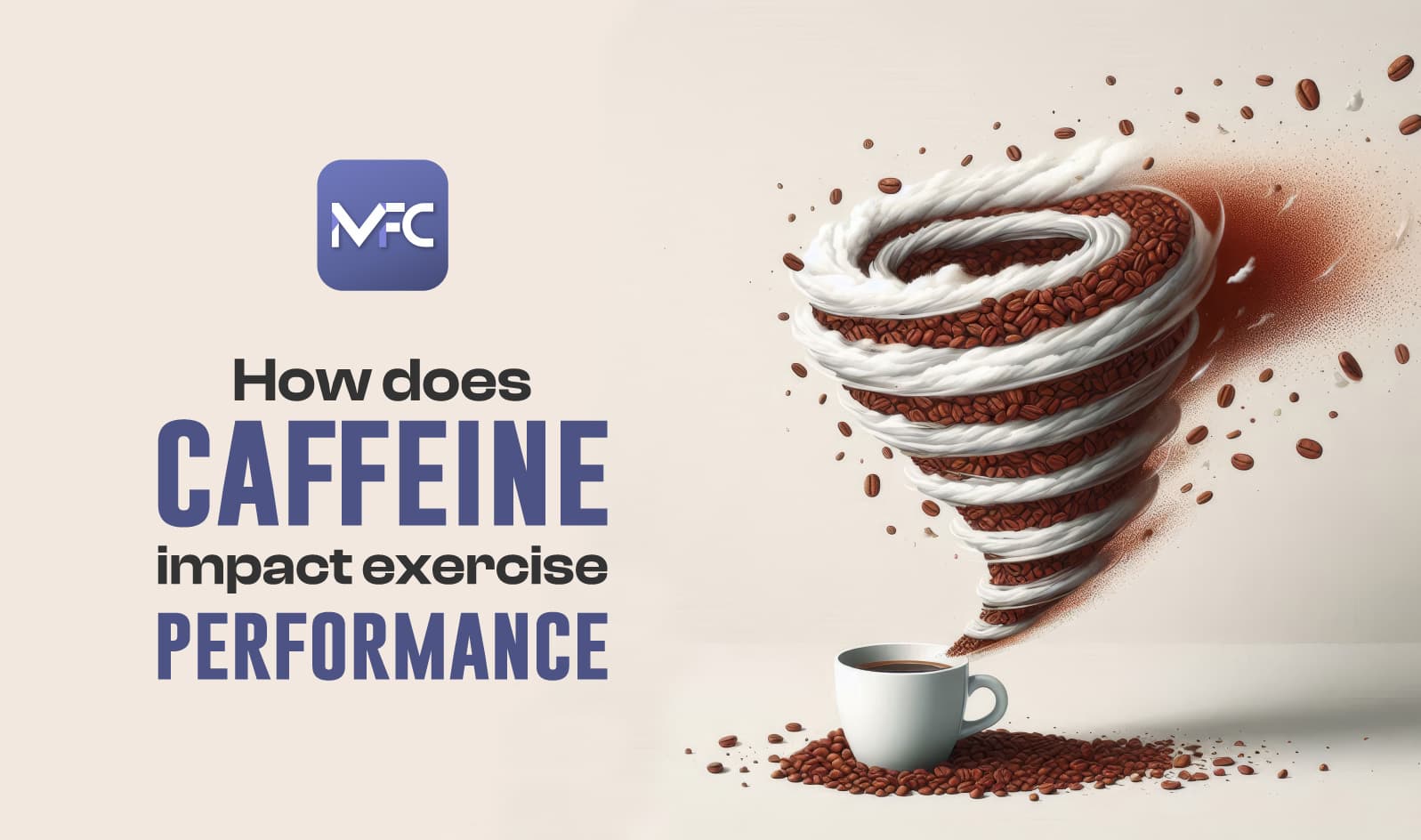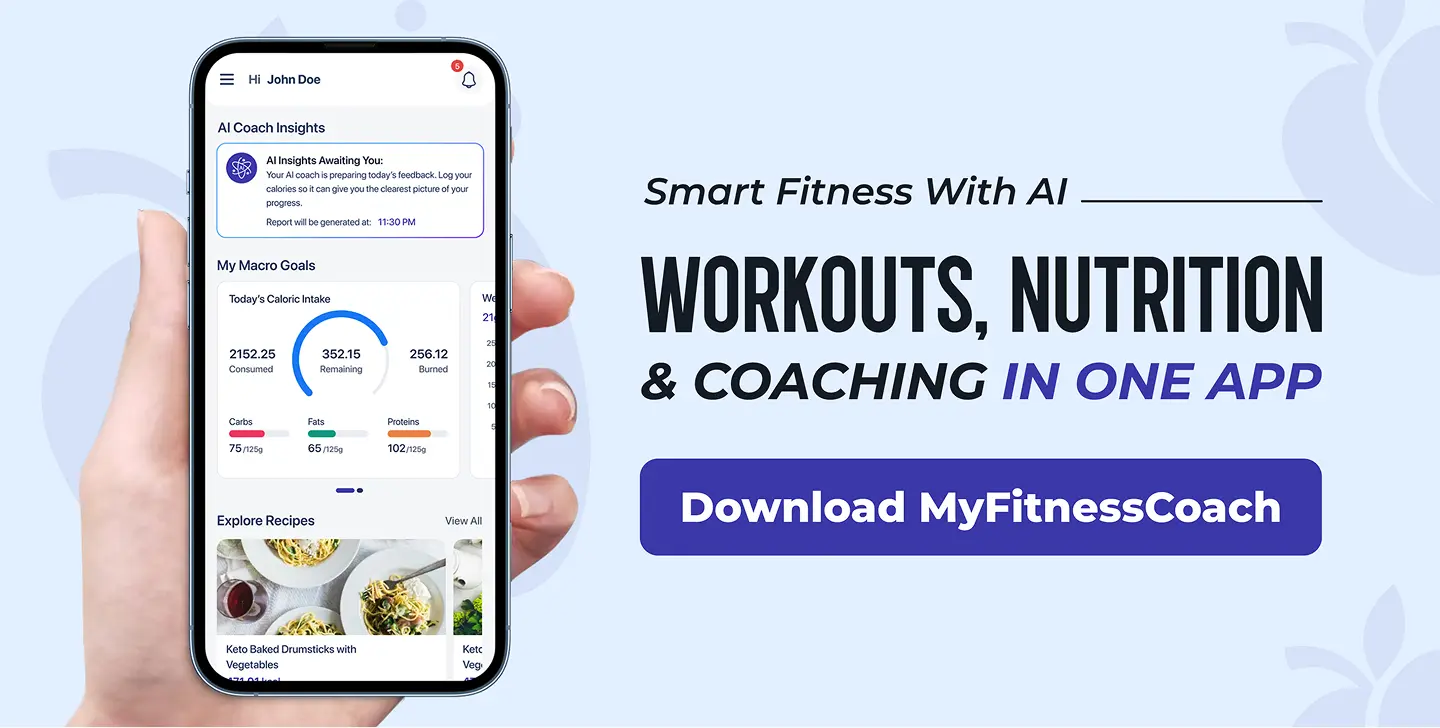How Does Caffeine Impact Exercise Performance?

MyFitnessCoach
December 26, 2024
Caffeine is one of the most popular performance-enhancing substances in the world. Found naturally in coffee, tea, and certain plants, caffeine has become a staple for many athletes and fitness enthusiasts. But how exactly does caffeine impact exercise performance, and is it a good idea to include it in your fitness routine? Let’s explore this topic in detail.
Benefits of Caffeine on Exercise Performance
1. Improved Endurance
Caffeine is known to help athletes perform better during endurance activities such as running, cycling, and swimming. It works by increasing the availability of fatty acids in the bloodstream, which the body uses as fuel during prolonged exercise. This helps conserve glycogen stores, delaying fatigue and allowing you to exercise longer.
2. Enhanced Strength and Power
Studies have shown that caffeine can also improve strength and power output. Whether you're lifting weights or doing high-intensity interval training (HIIT), caffeine can give you the extra push you need to perform at your best.
3. Reduced Perceived Effort
Caffeine can make exercise feel easier by reducing your perception of effort. This means that you can push yourself harder during workouts without feeling as tired as you normally would.
4. Improved Focus and Reaction Time
Caffeine enhances mental alertness, which can be particularly beneficial for sports that require quick decision-making and precise movements. From tennis to team sports like soccer, improved focus can give you a competitive edge.
5. Faster Recovery
Emerging research suggests that caffeine may aid in post-workout recovery by reducing muscle soreness and improving glycogen replenishment. This can help you bounce back faster and get ready for your next training session.
Potential Drawbacks of Caffeine
While caffeine offers numerous benefits, it’s essential to use it wisely. Here are some potential drawbacks:
- Overconsumption: Too much caffeine can lead to jitteriness, increased heart rate, and digestive issues.
- Dehydration: Caffeine has a mild diuretic effect, so it's crucial to stay hydrated during workouts.
- Tolerance: Regular caffeine use can lead to tolerance, meaning you’ll need more to achieve the same effects.
- Timing Matters: Consuming caffeine too late in the day can interfere with sleep, which is critical for recovery and overall performance.
- Individual Sensitivity: Some people are more sensitive to caffeine and may experience side effects even at lower doses.
How Much Caffeine Should You Take?
The optimal dose of caffeine varies from person to person, but studies suggest that 3-6 mg of caffeine per kilogram of body weight is effective for improving exercise performance. For example, if you weigh 70 kg, a dose of 210-420 mg of caffeine may be ideal. However, it’s always a good idea to start with a lower dose to see how your body responds.
Best Sources of Caffeine for Exercise
- Coffee: A cup of black coffee typically contains 80-120 mg of caffeine, making it a convenient and natural source.
- Pre-Workout Supplements: Many pre-workout formulas include caffeine to boost energy and focus.
- Energy Drinks: While effective, these often contain added sugars and artificial ingredients, so use them sparingly.
- Caffeine Tablets: These provide a precise dose of caffeine and are easy to carry.
- Green Tea: A milder option with lower caffeine content, green tea also offers additional health benefits from antioxidants.
When to Take Caffeine for Exercise
Timing is key when using caffeine to enhance your workouts. For best results, consume caffeine 30-60 minutes before exercise. This allows enough time for the caffeine to be absorbed into your bloodstream and take effect.
Caffeine and Different Types of Exercise
1. Endurance Activities
For endurance sports like running, cycling, or swimming, caffeine can help delay fatigue and improve overall performance. Studies show that it’s particularly effective in events lasting more than an hour.
2. Strength Training
In weightlifting and resistance training, caffeine can boost power output and reduce the perception of fatigue, enabling you to lift heavier or complete more repetitions.
3. High-Intensity Interval Training (HIIT)
Caffeine’s ability to enhance focus and reduce perceived effort makes it an excellent supplement for high-intensity workouts. You’ll find it easier to push through tough intervals and maintain performance throughout your session.
4. Team Sports
Sports like basketball, soccer, and hockey require a combination of endurance, strength, and mental agility. Caffeine’s effects on focus and reaction time can give you an edge in these dynamic environments.
Using the MyFitnessCoach App to Optimize Your Caffeine Intake
The MyFitnessCoach app can help you track your caffeine intake and its impact on your workouts. Here’s how:
- Personalized Recommendations: Input your weight, workout type, and goals to get tailored advice on caffeine dosage.
- Tracking: Log your caffeine consumption and monitor its effects on your performance and recovery.
- Insights: Use data analytics to see trends and understand how caffeine influences your workouts over time.
With MyFitnessCoach, you’ll have the tools to maximize caffeine’s benefits while avoiding its potential downsides.
Using a fitness app like MyFitnessCoach makes it easy to log your caffeine intake and understand its effects on your performance.
Caffeine is a powerful tool for enhancing exercise performance when used correctly. It can improve endurance, strength, and focus while making workouts feel easier. By tracking your caffeine intake and optimizing its timing, you can maximize its benefits and achieve your fitness goals.

Ready to take your workouts to the next level? Download the MyFitnessCoach app today and discover how caffeine and other strategies can help you crush your fitness goals. Let’s get moving!
Similar Articles
Stay informed with these similar articles.
%20(1)%20(1)%20(1)%20(3).webp&w=3840&q=75)
MyFitnessCoach
May 8, 2023
Delicious Fitness Meal Prep Recipes For A Healthy Lifestyle
Fitness is all about having a balance between workouts and an appropriate diet. Getting a proper nutritious meal is as important as doing a workout. Exercise and diet both go hand in hand. Hence, adding fitness meal prep recipes to your fitness routine is important to reach your goal. This article has articulated some delicious and healthy meal prep recipes for you. These recipes surely make your meal tasty as well as full of nutrients. Let’s wait no further and check them out.
.webp&w=3840&q=75)

MyFitnessCoach
March 5, 2025
Net Calories Meaning: A Simple Guide to Understanding Your Fitness Goals
When it comes to fitness and weight management, the term "net calories" is often thrown around. But what does it really mean? If you're trying to lose weight, gain muscle, or simply maintain your current physique, understanding net calories is crucial. In this article, we’ll break down the concept of net calories in simple words, explain how it impacts your fitness journey, and introduce you to a powerful tool—MyFitnessCoach—that can help you track and achieve your goals.
